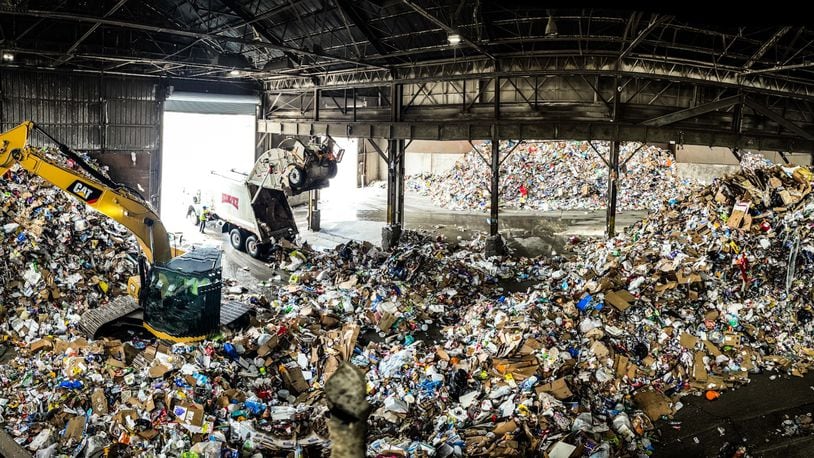Officials say there are multiple methods to prevent waste accumulation in landfills. Locals can recycle or reuse items, and even compost a lot of things they might consider throwing away.
Even those total solar eclipse glasses folks in Southwest Ohio used April 8 can head to a recycling center.
One Ohio solid waste district held a waste audit last week and pulled open bags of trash on its tipping floor to see what contents could be recycled. Recyclable materials they look for include, in part, the following:
- Glass bottles and jars
- Aluminum cans, steel cans and lids, empty aerosol cans with the lids and tips removed
- Plastic bottles and jugs that have a small mouth and wider base, such as milk jugs, soda bottles, laundry detergent bottles, water bottles, shampoo bottles and contact solution bottles
- Plastic tubs for butter, sour cream, cottage cheese, yogurt, Jello and fruit slices; would fall into the tub category. Lids should be reattached prior to recycling
- Fast food beverage cups, but discard the straw and reattach lid. Plastic cups are also recyclable
- Newspaper, magazines, cardboard, mixed office paper and envelopes, paperboard from cereal boxes, pizza boxes free of food debris and grease, telephone books, junk mail and catalogs
- Food and beverage cartons that store products like milk, broth and more
Those items are often sorted into bins by their type, are weighed and then recycled.
The easiest material to recycle is typically metal. Common recyclables are aluminum pop cans and other metal cans that store food. Beer bottles and other glass containers, too, are common household items that can be recycled.
Batteries can also be recycled, and some counties and landfills accept batteries at hazardous material drop off events. Waste collectors advise people to never throw away batteries, as they can cause fires that easily grow due to the abundance of paper and plastic products.
Not all plastic can be recycled
Recyclers tuck items away into their bins with the best of intentions, but not every disposable product can be recycled.
Plastic “clamshell” containers that store items like berries or other produce, for example, cannot be recycled, Rumpke officials said. Another commonly confusing item is plastic grocery bags. Plastic bags can cause a lot of harm to equipment in facilities that process garbage because they cling to the parts of different machines.
>> Check out Rumpke’s list of recyclable plastic
People wanting to minimize the number of plastic bags in landfills should return them to their respective grocery stores or retailers.
Some products, too, are pitched because they come to facilities covered in waste or grease. Contamination is the top reason a recyclable gets thrown away.
Peanut butter jars, for example, cannot be recycled if they’re still slathered in peanut butter, and the same goes for pizza boxes if the lid is covered in cheese and grease. Tin cans used to store cooking grease, too, cannot be recycled.
About the Author
